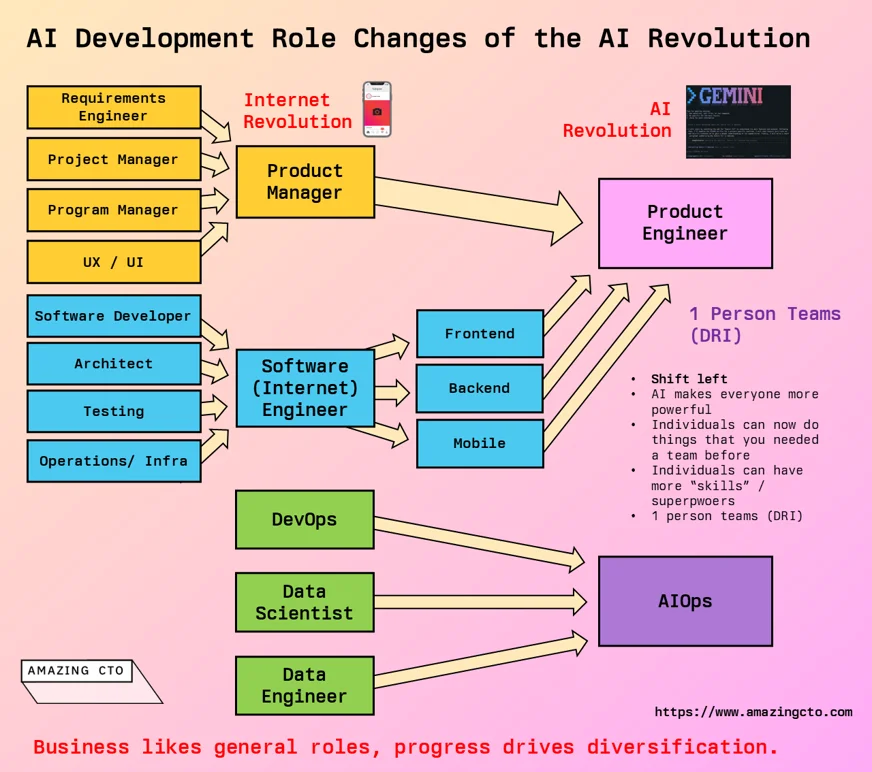Stephan Schmidt - September 23, 2025
AI - Coming Role Changes
How AI will change the roles of developers and managers
TL;DR: AI will drive role consolidation similar to the internet revolution: Product Managers and Software Engineers will merge into "Product Engineers" who manage AI systems, write code, and handle requirements, while DevOps, Data Scientists, and Data Engineers will consolidate into "AI Ops" roles focused on data pipelines and AI model management. Organizations should prepare by developing cross-functional skills and AI literacy now, knowing specialization will return later as the technology matures.
The internet revolution brought many changes to roles in software and product development. Those were driven overall by faster execution speeds which were themselves driven by bigger competition, more competition, easier distribution and lower barriers of entry.
Before the internet revolution software organisations had a myriad of roles, like requirements engineers, UX designers, product managers, software engineers, testers, operations engineers and architects.
While some of the roles are still there, the majority of organizations reduced those roles - if possible - to two new roles:
- Product Manager
- Software Engineer

When internet technology progressed, we saw a diversification of roles, into frontend developers, backend developers and mobile developers (iOS and Android). When a technology base becomes too broad with a skillset that is too big for one role, it is split into multiple roles as we have seen in the consolidation phase of the internet revolution.
There is pressure from businesses to reduce the number or roles and generalize roles. This makes it easier to hire, makes you more flexible and reduces the number of roles to be filled - e.g. if people leave. We have seen this in the internet revolution with the external impetus for faster change on the waves of the agile movement.
The same is going to happen with AI. The number or roles will shrink as much as possible in the forseeable future before specialization will expand the number of roles again.
Product managers and developers will fold into a product engineering role with:
- Manage AIs (code, UX)
- Write code as needed
- Do requirements engineering
- Interact with business
- Drive features from business demands, needs and strategy
The second role will be an AI ops role, that folds DevOps, Data Scientists, and data engineers into one role. It will:
- Manage data plumbing
- Integrate and clean data sources
- Run AI pipelines and models
As before, this revolution will shuffle roles and responsibilities around until they fit the new drivers.
FAQ: AI and the Future of Tech Roles
Q: Will AI eliminate the need for developers and product managers? A: No, but the boundaries between these roles will blur. Instead of separate product managers and developers, we will see more “product engineers” who combine business, requirements, and technical skills, often working alongside or managing AI systems.
Q: What is the “AI ops” role? A: AI ops is an evolution of DevOps, data engineering, and data science. This role will focus on managing data pipelines, integrating and cleaning data sources, and running AI models and pipelines in production.
Q: Will specialization disappear? A: Specialization will temporarily shrink as roles consolidate, but as AI technology matures and diversifies, new specializations will emerge—just as happened after the initial internet revolution.
Q: How should organizations prepare for these changes? A: Organizations should encourage cross-functional skill development, invest in AI literacy for both technical and business staff, and be ready to adapt their org charts as roles evolve.
Q: What skills will be most valuable in the new landscape? A: The ability to work with and manage AI systems, strong data literacy, business acumen, and adaptability will be key. Communication and collaboration across traditional boundaries will also become even more important.
About me: Hey, I'm Stephan, I help CTOs with Coaching, with 40+ years of software development and 25+ years of engineering management experience. I've coached and mentored 80+ CTOs and founders. I've founded 3 startups. 1 nice exit. I help CTOs and engineering leaders grow, scale their teams, gain clarity, lead with confidence and navigate the challenges of fast-growing companies.
